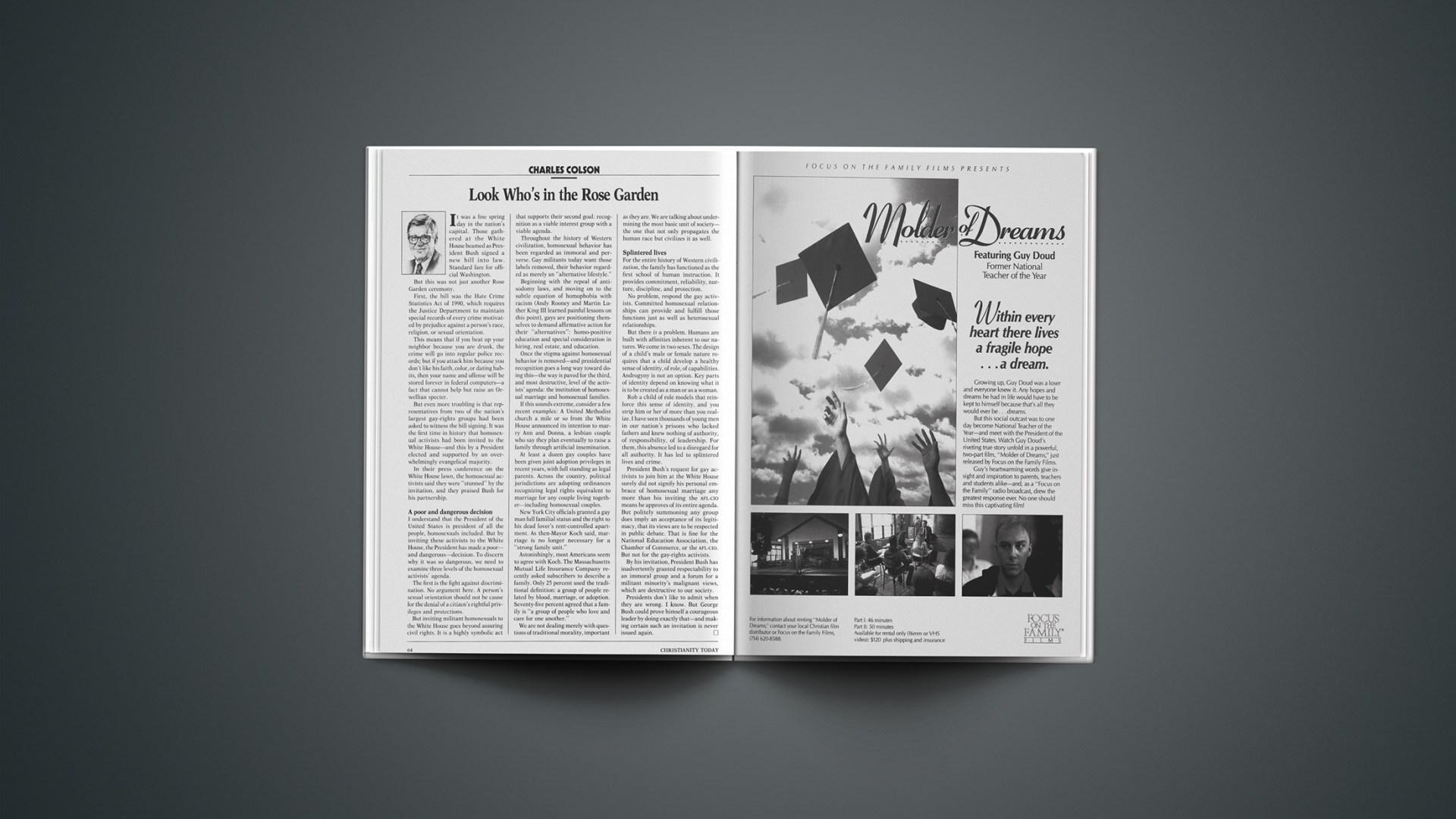It was a fine spring day in the nation’s capital. Those gathered at the White House beamed as President Bush signed a new bill into law. Standard fare for official Washington.
But this was not just another Rose Garden ceremony.
First, the bill was the Hate Crime Statistics Act of 1990, which requires the Justice Department to maintain special records of every crime motivated by prejudice against a person’s race, religion, or sexual orientation.
This means that if you beat up your neighbor because you are drunk, the crime will go into regular police records; but if you attack him because you don’t like his faith, color, or dating habits, then your name and offense will be stored forever in federal computers—a fact that cannot help but raise an Orwellian specter.
But even more troubling is that representatives from two of the nation’s largest gay-rights groups had been asked to witness the bill signing. It was the first time in history that homosexual activists had been invited to the White House—and this by a President elected and supported by an overwhelmingly evangelical majority.
In their press conference on the White House lawn, the homosexual activists said they were “stunned” by the invitation, and they praised Bush for his partnership.
A Poor And Dangerous Decision
I understand that the President of the United States is president of all the people, homosexuals included. But by inviting these activists to the White House, the President has made a poor—and dangerous—decision. To discern why it was so dangerous, we need to examine three levels of the homosexual activists’ agenda.
The first is the fight against discrimination. No argument here. A person’s sexual orientation should not be cause for the denial of a citizen’s rightful privileges and protections.
But inviting militant homosexuals to the White House goes beyond assuring civil rights. It is a highly symbolic act that supports their second goal: recognition as a viable interest group with a viable agenda.
Throughout the history of Western civilization, homosexual behavior has been regarded as immoral and perverse. Gay militants today want those labels removed, their behavior regarded as merely an “alternative lifestyle.”
Beginning with the repeal of anti-sodomy laws, and moving on to the subtle equation of homophobia with racism (Andy Rooney and Martin Luther King III learned painful lessons on this point), gays are positioning themselves to demand affirmative action for their “alternatives”: homo-positive education and special consideration in hiring, real estate, and education.
Once the stigma against homosexual behavior is removed—and presidential recognition goes a long way toward doing this—the way is paved for the third, and most destructive, level of the activists’ agenda: the institution of homosexual marriage and homosexual families.
If this sounds extreme, consider a few recent examples: A United Methodist church a mile or so from the White House announced its intention to marry Ann and Donna, a lesbian couple who say they plan eventually to raise a family through artificial insemination.
At least a dozen gay couples have been given joint adoption privileges in recent years, with full standing as legal parents. Across the country, political jurisdictions are adopting ordinances recognizing legal rights equivalent to marriage for any couple living together—including homosexual couples.
New York City officials granted a gay man full familial status and the right to his dead lover’s rent-controlled apartment. As then-Mayor Koch said, marriage is no longer necessary for a “strong family unit.”
Astonishingly, most Americans seem to agree with Koch. The Massachusetts Mutual Life Insurance Company recently asked subscribers to describe a family. Only 25 percent used the traditional definition: a group of people related by blood, marriage, or adoption. Seventy-five percent agreed that a family is “a group of people who love and care for one another.”
We are not dealing merely with questions of traditional morality, important as they are. We are talking about undermining the most basic unit of society—the one that not only propagates the human race but civilizes it as well.
Splintered Lives
For the entire history of Western civilization, the family has functioned as the first school of human instruction. It provides commitment, reliability, nurture, discipline, and protection.
No problem, respond the gay activists. Committed homosexual relationships can provide and fulfill those functions just as well as heterosexual relationships.
But there is a problem. Humans are built with affinities inherent to our natures. We come in two sexes. The design of a child’s male or female nature requires that a child develop a healthy sense of identity, of role, of capabilities. Androgyny is not an option. Key parts of identity depend on knowing what it is to be created as a man or as a woman.
Rob a child of role models that reinforce this sense of identity, and you strip him or her of more than you realize. I have seen thousands of young men in our nation’s prisons who lacked fathers and knew nothing of authority, of responsibility, of leadership. For them, this absence led to a disregard for all authority. It has led to splintered lives and crime.
President Bush’s request for gay activists to join him at the White House surely did not signify his personal embrace of homosexual marriage any more than his inviting the AFL-CIO means he approves of its entire agenda. But politely summoning any group does imply an acceptance of its legitimacy, that its views are to be respected in public debate. That is fine for the National Education Association, the Chamber of Commerce, or the AFL-CIO. But not for the gay-rights activists.
By his invitation, President Bush has inadvertently granted respectability to an immoral group and a forum for a militant minority’s malignant views, which are destructive to our society.
Presidents don’t like to admit when they are wrong. I know. But George Bush could prove himself a courageous leader by doing exactly that—and making certain such an invitation is never issued again.










